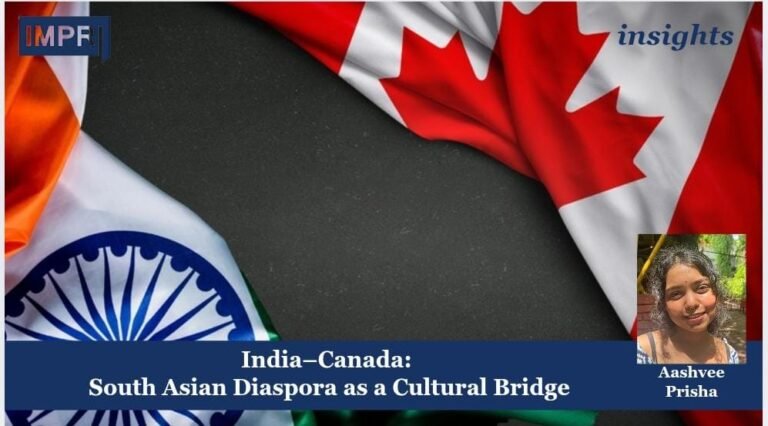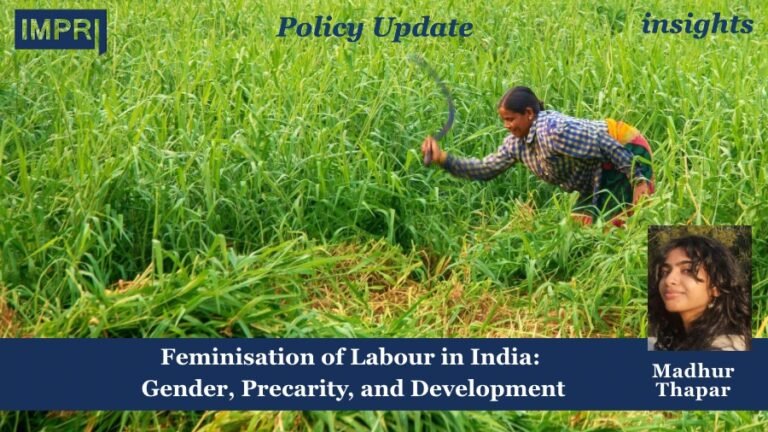Policy Update
Anto Mariya M M
Background
As a step towards rectifying the historical injustices done to the De-notified, Nomadic, and Semi-Nomadic Tribes, the Scheme for Economic Empowerment of De-notified/Nomadic Tribes (SEED) was rolled out by the Ministry of Social Justice and Empowerment in 2022. SEED aims to economically empower the De-notified/Nomadic Tribes (DNTs), who have been one of the most deprived and economically weaker communities in India.
These communities have faced systemic marginalisation and state neglect for a very long time. Their plight began under British rule when these tribal members were declared criminals by a draconian law, the Criminal Tribes Act 1871. Their lives were a misery, being stigmatised as ‘born criminals’. As they could no longer pursue their traditional occupation, they became pastoral and hunter-gatherers. They have also historically lacked access to private land and home ownership, leaving them with limited avenues for economic mobility.
While the DNTs lack the extensive state support that SCs/STs receive, the government is undertaking measures to uplift the De-notified, Nomadic, and Semi-Nomadic Communities. One such effort is the Scheme for Economic Empowerment of DNTs launched by Union Minister for Social Justice and Empowerment, Dr. Virendra Kumar, on February 15, 2022.
Functioning
SEED, an umbrella scheme for the welfare of the De-notified, Nomadic and Semi-Nomadic Communities, was launched with four components.
The four components of the Scheme include:
- Educational empowerment: Free coaching to students of the communities for competitive exams and entry to professional courses like medicine, engineering, MBA, etc.
- Health Insurance: Provide health insurance cover of Rs. 5 lakhs per family per year through Ayushman Bharat Pradhan Mantri Jan Arogya Yojana (PMJAY) of the National Health Authority (NHA).
- Facilitate Livelihoods: Livelihood initiatives through the National Rural Livelihood Mission (NRLM) and State Rural Livelihood Mission (SRLM) at the community level to support income generation.
- Housing: Financial assistance to members of DNTs for the construction of houses through Pradhan Mantri Awas Yojana (PMAY) with an admissible support of Rs 1.20 lakhs in plains and Rs 1.30 lakhs in hilly areas
Source: PIB
Under the Scheme, an expenditure of Rs. 200 Crore has been laid out for five years, starting from FY 2021-22 to 2025-26. The implementation of the Scheme is to be carried out by the Development and Welfare Board for De-notified, Nomadic and Semi-Nomadic Communities (DWBDNC). An important feature of the SEED scheme is the online portal developed by the Department of Social Justice and Empowerment.
Applicants can register their details on the portal. Upon registration, a unique identification (UID) will be generated. This UID is used for applying to the components of the Scheme. The online portal also becomes a repository of the data on these communities. It will provide a real-time status of the application to the applicants. The payment to the beneficiaries will be made directly into their accounts. The members of DNT Communities with a total family income of Rs. 2.50 lakh or less per annum and not availing any such benefits from similar schemes of the Central Government or the State Government will be eligible to avail benefits under this Scheme.
Performance
The Scheme of Economic Empowerment of De-notified/Nomadic Tribes (SEED) was designed to provide livelihood, education, healthcare, and housing support to De-notified Tribes (DNTs), Nomadic Tribes (NTs), and Semi-Nomadic Tribes (SNTs). SEED is a relatively new scheme launched in 2022 with a financial outlay for five years. The Scheme has actively received applications from members of DNT communities.
In its first year, the Scheme received 402 applications by August 29, 2022, and 5,400 applications by December 26, 2022. While the Scheme has great objectives, it has been slow in the implementation process. What has been holding up the implementation is the categorisation of DNTs, as well as the hurdles in identifying genuine beneficiaries of the Scheme. Overall, the performance of the Scheme has been inadequate. The issuance of caste certificates to DNTs has been delayed by the state and UT administrations. Maharashtra, Madhya Pradesh, Tamil Nadu, Uttar Pradesh, Gujarat, Haryana, and Rajasthan are the only seven states that are issuing DNT certificates. As a result, many beneficiaries have been unable to access the benefits of the Scheme.
Impact
- Educational Empowerment
Education is rightfully recognised as a tool for socio-economic mobility, and under the Scheme, quality coaching is provided to students aspiring for civil services and entrance into professional courses. Under the Educational Empowerment component, coaching centres have been started in states like Tamil Nadu and Gujarat. 541 DNT students have benefited from the Scheme as of March 11, 2025.
- Livelihood Generation
Under the Livelihood Initiatives Component of SEED, 2,620 Self-Help Groups (SHGs) involving 29,517 beneficiaries have been formed in eight States, namely, Gujarat, Andhra Pradesh, Maharashtra, Madhya Pradesh, Tamil Nadu, Uttar Pradesh, Rajasthan, and Haryana, to support the livelihood generation of these communities. (as of March 11, 2025)
- Health Insurance
Most members of DNT, SNT, and NT communities have little to no access to medical facilities and benefits under mainstream health policies. The Scheme under the component of Health Insurance has distributed over 7,000 Ayushman Cards as of November 2024.
- Housing
A large number of families belonging to the DNT/NT communities are without permanent shelters. With this consideration, the Housing component is included in the Scheme, and sanctions were sought for around 3000 housing applications till November 2024.
- Digital Integration
In a step towards digital integration, an online portal was unveiled for seamless registration and storage of data on these communities. While many de-notified, nomadic, and semi-nomadic communities are unable to navigate the online system themselves, camps have been conducted by officials from the ministry and the DWBDNC across the country to help the applicants sign up on the web portal.
Emerging Issues
- Categorisation Ambiguity
The Idate Commission prepared the lists of DNT/NT/SNT Communities in its 2017 report. It listed 1,262 such communities and categorised them under SC, ST, OBC, and others. The report also included over 260 communities that did not fall under either the SC, ST, or OBC lists. The DWBDNC is working with this list as enumerated by the Idate Commission. But there have been sluggish efforts to categorise these 267 de-notified, nomadic, and semi-nomadic tribes under the SC, ST, or OBC lists. The Anthropological Survey of India (ASI) and Tribal Research Institutes are studying the unclassified communities to categorise them under either SC, ST, or OBC. This classification deadlock has caused a delay in the execution of the SEED scheme.
There also exist inconsistencies in the 1,262 classified communities. The same communities have been classified under different lists in different states or districts within the same state as well. The difference in spelling of communities based on local dialects has even caused hiccups. These issues have prevented them from receiving caste certificates, which hinders them from accessing the benefits of the schemes.
- Issues in Beneficiaries’ Identification
Identification of genuine beneficiaries has been a hurdle as some from these communities are already receiving benefits under schemes for SC, ST, and OBC communities. Unlike the central list of SCs and STs, there is no set of lists for DNTs, SNTs, and NTs. This is due to the lack of constitutional recognition for the de-notified and nomadic communities.
- Data Collection Gaps
There is a lack of accurate information on the de-notified, nomadic, and semi-nomadic communities. This inadequate data affects the identification, verification, and monitoring of the Scheme’s targets.
- Social Stigma
The systemic marginalisation of DNTs, SNTs, and NTs has been due to the stigma of criminality, which still persists. Thus, getting rid of this stigma is the only way for the communities to lead a dignified life and strive for economic development.
- Documentation Barriers
Many States and UTs have not been issuing community certificates to DNTs, which is essential to access the developmental schemes. Members of the DNT, SNT, and NT communities perceive this as a denial of their identity. Only seven states are found to be issuing DNT certificates. The communities also face trouble in obtaining caste certificates because many do not have permanent residence or certification for the same. Thus, issues with the caste certificate impede the community’s access to government welfare schemes.
Way Forward
The SEED Scheme is a small step in progress, but more attention and efforts targeting the upliftment and social inclusion of De-notified, Semi-Nomadic and Nomadic communities are needed for the holistic development of the community. Addressing the issues within the execution of this Scheme also becomes pertinent. Making the government schemes and benefits more accessible to the communities is urgent to redress the historical discrimination. Adequate steps to ensure proper identification of the Scheme’s beneficiaries and expediting the categorisation process will ensure the Scheme’s benefits reach even the last mile.
More than 10 crore Indians from 1,400 communities belong to these groups, as per the latest estimates available from the government. However, their voices remain unheard. Integrating the significant population into the mainstream requires extensive state support.
Eliminating the social stigma around the community must be a priority, as DNTs, SNTs, and NTs have long suffered from prejudice and are bereft of basic rights. The tag ‘born criminals’ must be destigmatised. Communities like saperas (snake-charmers), madaris (street jugglers), banjaras (gipsies), bahuroopis (impersonators), lohars (blacksmiths), kathputlis (puppeteers), and aaradhis (devotional crooners) have contributed to India’s rich cultural heritage. Thus, unlocking the potential of de-notified communities and fostering an equitable future must be the way forward.
Reference
- Chiranjib Haldar, & Chiranjib Haldar. (2025, January 26). Forgotten tribes. Deccan Herald. https://www.deccanherald.com/opinion/forgotten-tribes-3373960
- Department of Social Justice and Empowerment. (n.d.). SEED Scheme. Government of India. https://dwbdnc.dosje.gov.in/content/seed-scheme
- Press Information Bureau. (2022, February 25). Scheme for Economic Empowerment of Denotified/Nomadic/Semi-Nomadic Tribes (SEED). Government of India. https://static.pib.gov.in/WriteReadData/specificdocs/documents/2022/feb/doc202222519501.pdf
- Press Information Bureau. (2022, February 16). Union Minister for Social Justice & Empowerment Dr. Virendra Kumar launches a Scheme for Economic Empowerment of DNTs (SEED). Government of India. https://www.pib.gov.in/PressReleaseIframePage.aspx?PRID=1798792
- Lakshman, A. (2025, January 3). At meeting on welfare of DNTs, States’ refusal to issue community certificates flagged, Centre urged to act. The Hindu. https://www.thehindu.com/news/national/at-meeting-on-welfare-of-dnts-states-refusal-to-issue-community-certificates-flagged-centre-urged-to-act/article69054737.ece
- Lakshman, A. (2022, August 29). Denotified, nomadic, semi-nomadic tribes: 402 SEED registrations so far online, none approved yet. The Hindu. https://www.thehindu.com/news/cities/Delhi/denotified-nomadic-semi-nomadic-tribes-402-seed-registrations-so-far-online-none-approved-yet/article65827103.ece
- Lakshman, A. (2025, January 10). Denotified tribes’ anger boiling over amid a stagnating scheme and classification deadlocks. The Hindu. https://www.thehindu.com/news/national/denotified-tribes-anger-boiling-over-amid-a-stagnating-scheme-and-classification-deadlocks/article69085545.ece
- Lakshman, A. (2022, December 26). Expedite categorisation of denotified, nomadic, semi-nomadic tribes: House panel. The Hindu. https://www.thehindu.com/news/national/expedite-categorisation-of-denotified-nomadic-semi-nomadic-tribes-house-panel/article66307303.ece
About the Contributor
Anto Mariya M M is currently pursuing her postgraduate degree in Political Science at Madras Christian College. She is a research intern at IMPRI.
Acknowledgement
The author sincerely thanks Ms Aasthaba Jadeja and the IMPRI team for their valuable support.
Disclaimer: All views expressed in the article belong solely to the author and not necessarily to the organisation.
Read more at IMPRI
Revising MOPRI’s CSS for 2022-2026: Revamped Rashtriya Gram Swaraj Abhiyan (RGSA)
Unnat Bharat Abhiyan (2014): Rethinking Development through Rural Empowerment



